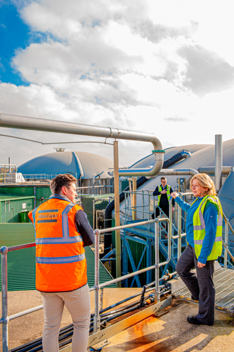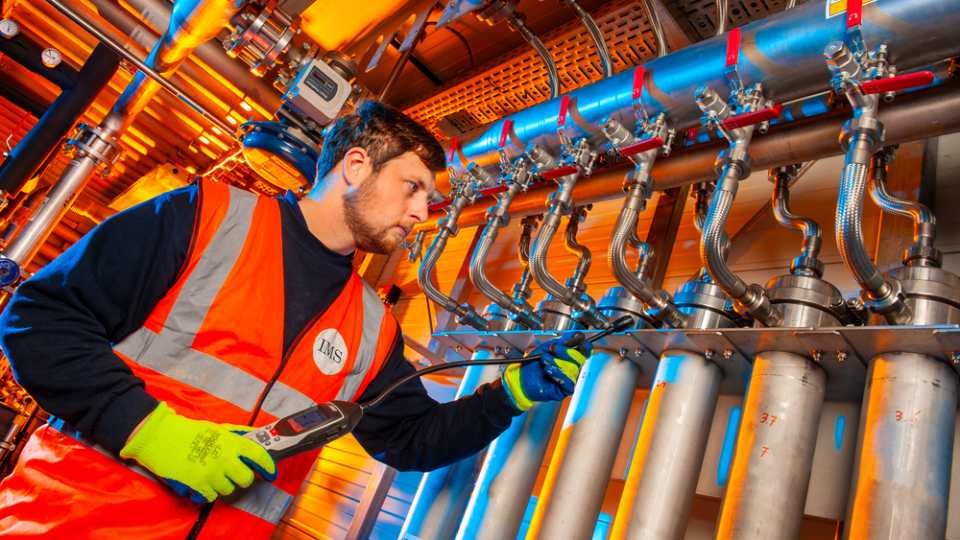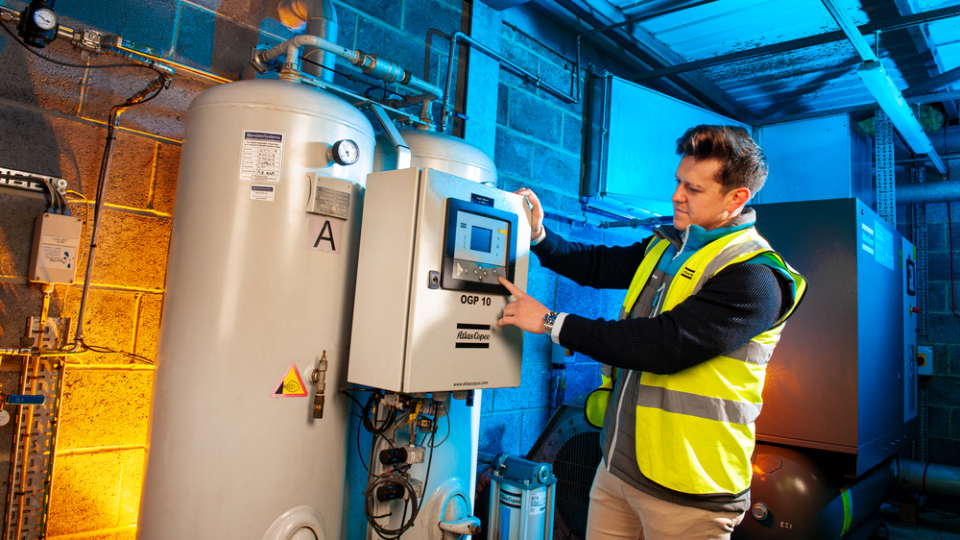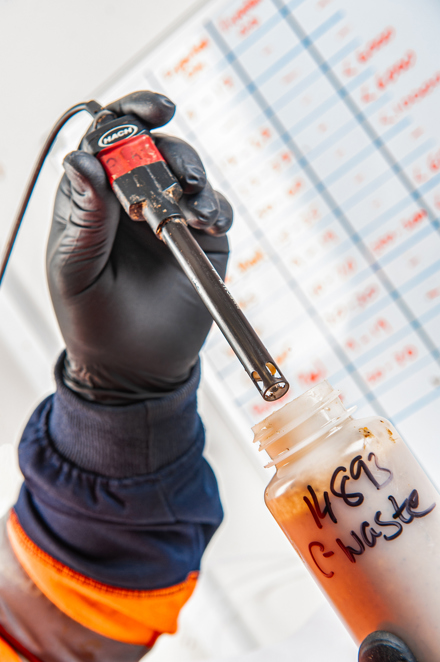19th November, 2024 - Atlas Copco is supporting Iona Management Services in the production of high-quality biogas for general consumption by ensuring a reliable supply of pure oxygen at the Leeming Biogas facility in North Yorkshire. Atlas Copco supplied the original oxygen generation equipment via the EPC contractor when the biogas facility was originally built, and has since also supplied two additional air compressors. Atlas Copco now provides ongoing support to maintain equipment on-site to manufacturer specifications, including third-party equipment as well as its own oxygen generator and air compressors.
Iona Management Services (IMS) is one of the UK’s leading independent service providers within the low carbon renewables sector. Alongside other disruptive technologies, they provide operations and maintenance services on-demand to anaerobic digestion, combined heat and power (CHP) and biomass projects. Leeming Biogas became part of its portfolio in 2014. It generates over five million cubic metres of biomethane annually, which is directly injected into the local gas grid. It also produces PAS110 accredited digestate that is used on nearby farmlands.

Pure oxygen is key
The Leeming Biogas plant uses food waste products as its feedstock and deploys anaerobic digestion techniques to generate biomethane. Anaerobic digestion comprises a series of biological processes that use microorganisms to break down biodegradable material in the absence of oxygen. So why is the Atlas Copco oxygen generator so crucial for success?
James Smith, IMS General Manager for the Leeming Biogas plant, explains: “It may seem counterintuitive, but oxygen is fundamental to the generation of grid-quality biogas. It stabilises the biological activity inside the fermenters, which promotes efficient gas generation and helps to reduce unwanted by-products such as hydrogen sulphide.”
Hydrogen sulphide (H2S) is a particular concern because the food waste processed at the Leeming facility has a potentially high sulphur content. H2S is a highly flammable and corrosive gas, so it presents a potential safety risk and damages downstream equipment. Hydrogen sulphide also has a distinctive ‘bad eggs’ odour, so IMS aims to eliminate it from the process for the sake of site operatives and the local community.

“The Atlas Copco oxygen generator enables us to use pure oxygen to regulate and control biological activity in the fermenters. This reduces the need for expensive and potentially hazardous chemicals, which is better environmentally and reduces total cost of ownership.” continues James.
As a gas-to-grid site, the amount of oxygen allowed in the final gas stream (less than 1%) is also strictly limited. The reliable source of high-purity oxygen from Atlas Copco’s OGP10 oxygen generator makes controlling the levels easier, although the process requires regular manual intervention rather than automated dosing.
Reliable on-site O2 generation

An Atlas Copco OGP10 oxygen generator offers 90% to 95% oxygen purity at ISO 8573-1 Class 1.2.1 standard to meet customer quality requirements. It uses proven Pressure Swing Adsorption technology (PSA) to isolate oxygen molecules from other molecules in compressed air, resulting in high-purity oxygen at the outlet of the generator. This enables the OGP10 to deliver a reliable supply of oxygen 24/7, at the exact purity required for the application and with its low operating cost and minimal maintenance requirements. Feeding the OGP10 with air is an Atlas Copco GA15FF rotary screw compressor. Iona also has a G15L FF compressor for instrument air and as a back-up, associated filtration and oil-water treatment equipment, plus an air receiver and an oxygen receiver. It also has a small piston compressor for plant duties.
Having completed over 62,000 hours of running, the OGP10 and compressor installation have provided Iona with a reliable and economical alternative to using alternative oxygen generators or third-party oxygen suppliers. Onsite oxygen generation also contributes to more sustainable operations by eliminating the carbon footprint associated with multiple oxygen cylinder deliveries.

Sustaining growth
In addition to the reliability and performance of its OGP10 oxygen generator and compressors, IMS is very pleased with the service it receives from Atlas Copco. Integration with the on-site team, good response times and detailed reporting save IMS time, enabling them to focus on optimising biogas production.
In conclusion, James says: “At IMS, we believe that low carbon energy projects are one of the fastest ways for consumers to embrace the necessary transition to a sustainable economy. However, renewable energy generation is a dynamic industry, and innovations are being made all the time. Atlas Copco keeps me and my team abreast of new technological developments that could add further value to our operations, such as improving efficiency, and are committed to supporting our sustainability goals.”
For more information about Atlas Copco oxygen generators, please click here.











McMurtry Spéirling defies gravity using fan downforce
Ground effect fans were banned from competitive motorsport from the end of the 1978 season following the introduction of Gordon Murray's Brabham...